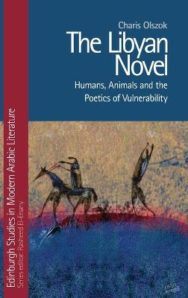
ABOUT THIS BOOK
PUBLISHER: Edinburgh University Press
FORMAT: Hardback
ISBN: 9781474457453
RRP: £75.00
PAGES: 256
PUBLICATION DATE:
July 31, 2020
BUY THIS BOOK
As an Amazon Associate and Bookshop.org affiliate we earn from qualifying purchases.
The Libyan Novel
Charis Olszok
Traces the developments in Libyan novel writing from the 1970s to 2011 through encounters between human, animal and landLocates the study of internationally renowned authors Ibrahim al-Kuni (b. 1948) and Hisham Matar (b. 1970) within the context of their Libyan compatriotsAnalyses works by al-Sadiq al-Nayhum and Ahmad Ibrahim al-Faqih, previously neglected in English-language scholarshipAdds nuance to the understanding of animals as straightforward political allegory, and brings a non-western, Islamic perspective to the study of the ‘creaturely’Tackles postcolonial themes from the little-studied case of Italy and LibyaSuggests new approaches to postmodernism within a politically and economically isolated countryAnalysing prominent novelists such as Ibrahim al-Kuni and Hisham Matar, alongside lesser-known and emerging voices, this book introduces the themes and genres of the Libyan novel during the al-Qadhafi era. Exploring latent political protest and environmental lament in the writing of novelists in exile and in the Jamahiriyya, Charis Olszok focuses on the prominence of encounters between humans, animals and the land, the poetics of vulnerability that emerge from them, and the vision of humans as creatures (makhluqat) in which they are framed.As Libya transforms into a dictatorial, rentier state, animals represent multi-layered allegories for human suffering, while also becoming focal points for empathy and ethics in their own right. Within reflections on Italian colonisation and ensuing forms of political and social oppression, concomitant with oil, urbanisation, exile and war, staged in remote deserts, isolated coastlines and neglected city parks, The Libyan Novel examines how physical, emotional and intellectual hardship prompts empathetic gazes across species lines. Through engagement with the folkloric and Sufi traditions that define the country’s past and shape its modern fiction, it further traces the spiritually, environmentally and politically holistic imaginings that contest a precarious reality.
Charis Olszok
Dr Charis Olszok is a Lecturer in Modern Arabic Literature and Culture at the Faculty of Asian and Middle Eastern Studies, University of Cambridge. She has translated two novels and numerous pieces of short Arabic fiction into English. This is her first monograph.









